For an effective job search or if seeking career progression, you need to have a good Curriculum Vitae (CV). This tip sheet is produced to assist you in developing a strong CV, to market your academic qualifications, work experience and accomplishments.
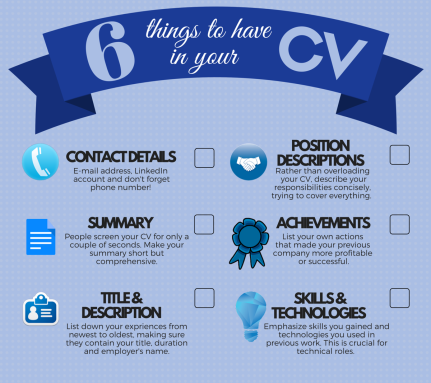
[SOURCE: https://agilesearch.io/fi/6-things-to-have-in-your-cv-infographic/ ]
Tip 1 – Target your CV to each role and company you are applying for
- Each job and company are a Unique Client, so Tailor each CV (product YOU) to a specific employer and the role (buyer). Each industry, employer and their requirements for positions are different.
- Targeting a CV helps you with deciding what is relevant information to include and to declutter your CV.
- Tailoring your CV helps you to decide which experience and accomplishments to amplify.
- The process of developing your CV to fit a job is good for understanding what the role requires, gaps you may have and identifying ways to cover these gaps in your representation.
- This is a good way of beginning to prepare for the interview.
Tip 2 – Pick the right type of CV for the role you are applying for and in line with your work history or career stage
- Master CV keeps a record of all the paid and unpaid work you have done, education and training records. It makes it easier to develop a targeted CV in any of the following formats.
- Functional CV is not sequential, it highlights what you are good at focused on the work you are seeking e.g. skills or accomplishments, and not where and when you did it.
- Chronological CV highlights your skills, experience, as well as education and training history in sequential order. It provides a timeline of your career journey.
- Combination CV brings the functional and chronological CV elements together. It is good when transitioning careers as it shows what you can do via your skills and work history.
- Mullet CV is a one-page profile that provides both your professional information as well as personal information that helps people understand you better. Whole person CV.
- Inspiration CV – this is your CV in the future. Write a CV that states who you want to be and what knowledge, experience and profile you will have in 5 years. Now put in place a plan to work towards that profile 😊. It’s a tool for growth.

[SOURCE: http://www.pelosleclaire.com/parts-of-a-resume/ ]
Tip 3 – Contact Details and Online Links section – be up to date and keep a clean online footprint
- You should be reachable on all the contact details you provide and use a specific job search e-mail using your last name first initial that is professional (e.g. brownj@gmail.com).
- Avoid any details that could result in bias against you. Unless legally required, do not include your photo, marital status, age, gender, family, Identity number, legal status, as recruiters are human and susceptible to prejudice e.g. towards mothers or old people.
- Include your LinkedIn url and website url, and make sure that your online presence is clean, aligned to your self-portrayal in the CV, represents you well to future employers.
- Protect yourself from social media screening – review security settings and adjust who can view your online activity on social media pages such as Facebook and Instagram.
- Develop your LinkedIn profile and online presence. Online personal branding can work for you, so be clear about who you want people to see you as through your online posts.
Tip 4 – Career Objective and Summary section – align these to the job and company needs
- Career Objective – you should have one. Link your objective to the needs of the company and role to further demonstrate alignment and you as a “solution”, not your own personal goals. Research the company if possible.
- Summary /Profile section is where you need to sell yourself in an elevator pitch format to the reader, so open strong with the first 15 -20 words.
- Describe yourself to stand out, but also be authentic in the words you use. The recruiter should notice you and want to read more.
- Start with a descriptor or job title g. “Learning and Development Expert” (even if you have never formally held this title), and then include your key competencies “with global experience of learning design and change management,” and your soft skills “who is also a collaborative team player and coaching leader”.
- Think carefully about the impression you want to leave the reader with about you, your abilities and aim to show that you are the right person to hire.

Tip 5 – Skills section – choose skills that are relevant to the role you are applying for not what is popular or buzz words
- CVs are a marketing tool, it represents you as the “product”, so ensure the skills you choose are what the hiring company “buyer” is looking for.
- For key skills list look for guidance from the job advert or role description for the competencies required. These are the ones you should profile.
- Your CV should present 3-5 core skills and personal traits or strengths you have. They should relate to the job you are applying for. These should be both technical and soft skills.
- Support each skill presented with work experience, training, accomplishments or any recognition you received. This should be aligned to your CV content.
- Present your accomplishments using the STAR method. Your CV content should answer: what the Situation was, the Task or role you had, the specific Actions you took and the Results you got. E.g. Increased social media followers from 1200 to 5600 using multiple engagement methods.
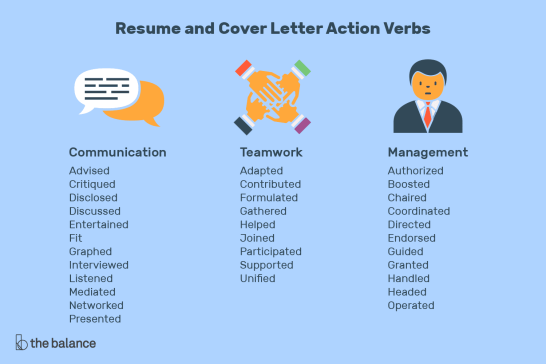
Tip 6 – Work Experience section – be Accomplishment focused so Don’t list your responsibilities or duties in the job description
- Include all relevant details – ensure you put the title of the role, the year, the organisation and location if relevant.
- Open with 1-2 lines of what you were responsible for, the scale and reach of your role and whether you managed people or had a budget.
- Focus on what you did not a list of duties. The hiring agent or company does not want to know what you were tasked to do, they want to know what you did and with what results.
- Quantify achievements if possible, by giving powerful and tangible examples of your accomplishments. Use verbs that help state what you did, not cliché words that do not explain clearly.
- Gap in experience – do not lie. Represent the gap and options of what you were doing are: gap year after school or college to travel and gained multicultural experience; parental break; sabbatical to study or write, volunteer work, entrepreneurial venture with x,y,z results and lessons etc.
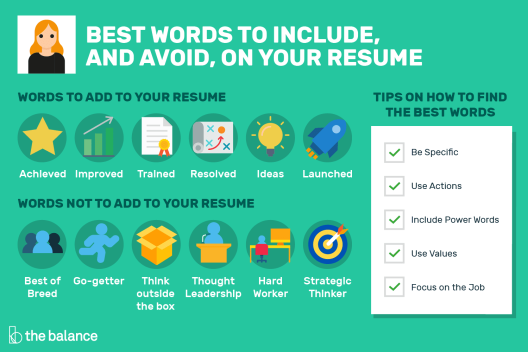
[SOURCE: https://www.thebalancecareers.com/top-words-to-include-and-avoid-in-your-resume-2063329 ]
Tip 7 –Education and training section – focus on minimum requirements and what is recent and relevant to the role
- Do not be limited by education and training if you meet 70%+ of the other requirements as you may have transferable experience from life, other jobs and volunteer work.
- Ensure you highlight education and training that is minimum requirement for the role.
- Focus on education and training that is relevant to the job you are applying for.
- Only put your education at the top if its an academic job, any other application, highlight your experience first.
- Explain acronyms, do not assume everyone understands your education and do not include your thesis title, unless easily understood.
- No higher education like a degree, diploma or even a certificate – you can create a Professional Development section that captures recent or ongoing training, seminars, conferences, online courses you have taken that are relevant to the job you are applying for. Note that some hiring companies ask for certificates and verification.

[SOURCE: https://www.thebalancecareers.com/entry-level-resume-examples-2063578 ]
Tip 8 – Other things to consider section – Volunteer experience, Hobbies, Conferences and Publications
- Volunteer experience – at any career stage this is great way to gain experience, develop skills and make a social contribution. Include this if you do not have a lot of experience, it is relevant to the role, or you want to highlight something related to your skills or character.
- Hobbies and Interests – be very careful here. Only include if relevant and adds value.
- Only if relevant include conferences – have a separate section for conferences attended where you presented papers.
- Publications – there are some roles that require this and others where it does not make a difference. Make a judgement call and include if relevant.
Tip 9 – References section – Your Choice and Relationships are critical in helping your case
- Respect Referees – talk to the people you want to include as referees first before including them on your CV. Calling and telling someone after the fact is disrespectful and does not help you.
- Choose a Referee who knows you – a referee is your last line of defence as they speak or act on your behalf when they are contacted, so choose someone who knows your work well and is willing to stand in for you.
- Relevance – the Referees you choose have to be relevant to the job you have applied for.
- Have a robust network, a strong one has 15 roles – build relationships in your network before you need them or ask someone to write a reference letter for you or wait for a call.
- Prepare your Referee so that they know how to represent you – so share your application package with them, which is the job advert, your CV and cover letter.

Tip 10 – Look and Feel of your CV – this is as important as the content so pay close attention to impressions
- Be aware of ATS (Applicant Tracking Systems) – nowadays a lot of the initial screening is done by computer, so you need to align your content with key words in the job advert and have simple formats.
- Format – You can use templates but be careful because it must be one that best showcases your skills, experience and accomplishments.
- Length – a CV should be between 2-3 pages maximum. It is possible to have one up to 5 pages if it is an academic one with several publications.
- Font – use consistent popular font like Arial, Tahoma and New Times Roman, font size 11 or 12.
- Visual presentation – have clear headings, work on bullets, dates, heading and content alignment. You can add a little colour but have white spaces to make it easy to read, and do not cram text.
- Coherence career story and flow of sections – The content also must be organized in a way that makes sense to the reader and role requirements without needing you to be there to explain it.
Closing words: a good and regularly updated CV is a career development and career management essential. It is not only about having the document, but the reflection and capturing process of your experience, accomplishments, education history, updated referees is crucial in helping you to be “present” and “intentional” in your career.
What to do next – Join us tomorrow –
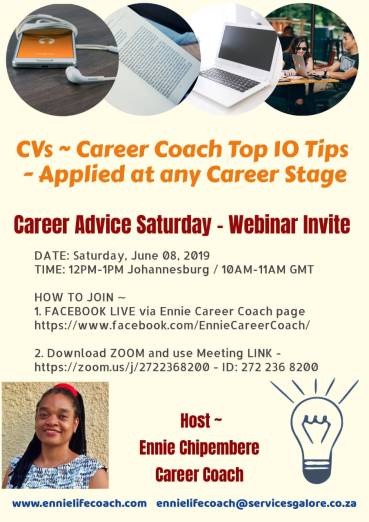
The End!
Individuals: If you need support on how to utilise this career information for career planning, job search, career progression or CV/resume review and writing, whether currently employed or not, get in touch using the e-mail address provided. Also share and follow this work 😊.
 Written by: Ennie Chipembere Chikwema, Career Coach and Learning Specialist;
Written by: Ennie Chipembere Chikwema, Career Coach and Learning Specialist;
E-mail: ennielifecoach@servicesgalore.co.za
LinkedIn Profile: https://za.linkedin.com/in/ennie-chipembere-chikwema-81a30910a
Facebook Page: https://www.facebook.com/EnnieCareerCoach/
Twitter: @EnnieChipembere
Date published: 07 June 2019
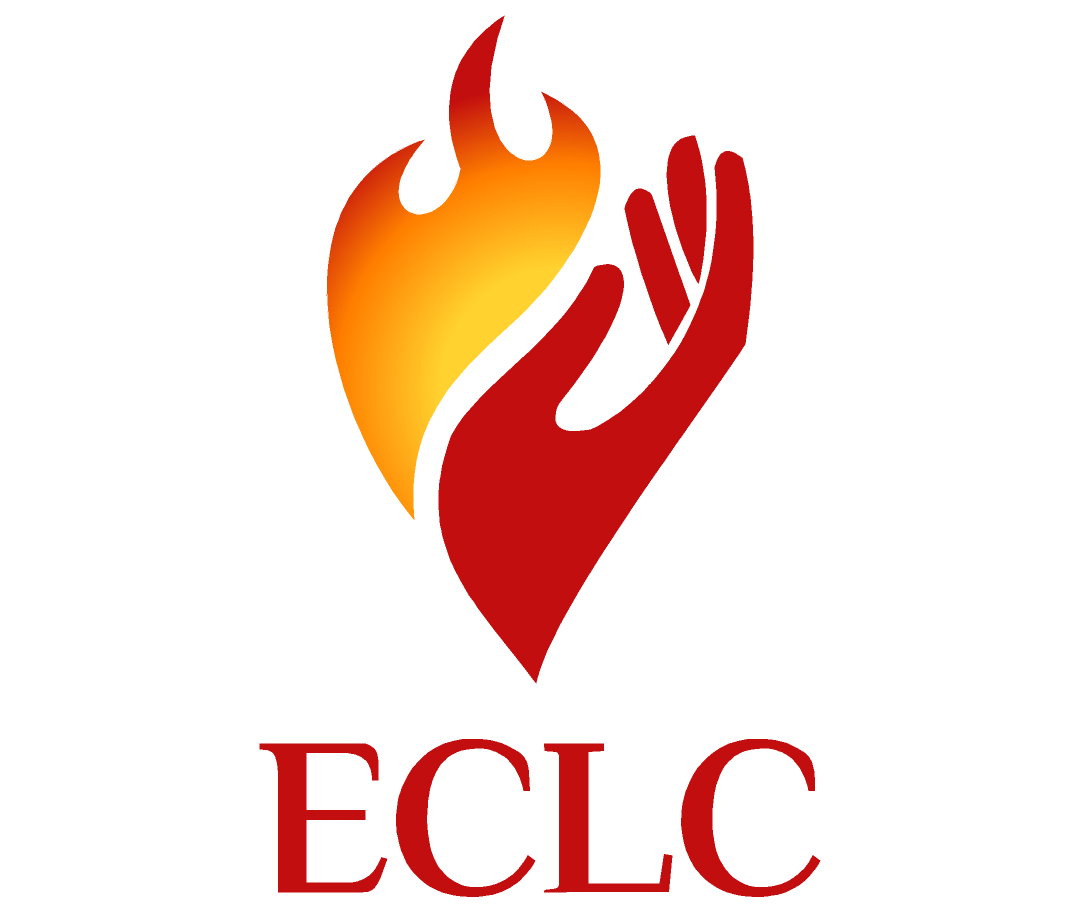

Morning ,thank you so much,you are such an inspiration and your hard work is reallybuikding nation. I remain grateful and aspire to have such focus and giving mentality.
Kind Regards
Busisiwe
LikeLiked by 1 person
Busisiwe, thank you for taking the time to read, follow the work and provide positive and affirming feedback that is fuel to me. I am morivated by people like you who find value in the career information, trends analysis and resources shared. #powertoyou
LikeLike
Found the article very practical with useful tips. Thanks Ennie! Will share with colleagues.
LikeLike